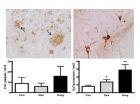(Press-News.org) A whole-genome scan to identify large-scale chromosomal damage can help doctors choose the best treatment option for children with neuroblastoma, one of the most common types of childhood cancer, finds an international collaboration jointly led by The Institute of Cancer Research, London.
The researchers called for all children diagnosed with neuroblastoma worldwide to have a whole-genome scan as a standard part of their treatment.
Neuroblastoma, a cancer of the developing nervous system, is sometimes very treatable but other forms are highly aggressive, making the disease overall one of the leading causes of death from childhood cancer. As intense treatments can carry life-long side-effects, identifying the form is crucial in giving an accurate prognosis and deciding the most appropriate care.
Scientists examined the medical records of 8,800 neuroblastoma patients from around the world and found that several large-scale genetic faults were strongly linked to survival rates, and that a whole-genome scan would therefore be more effective at predicting prognosis than tests for individual genetic factors. The study is published in the British Journal of Cancer today.
Senior author Professor Andy Pearson, Cancer Research UK professor of paediatric oncology at The Institute of Cancer Research and a paediatric consultant at The Royal Marsden NHS Foundation Trust, said: "Our study has found that every single patient diagnosed with neuroblastoma should have a whole genome assessment. The technology required to carry out these scans has become much more widely available and cheaper over recent years, and we believe most diagnostic labs in developed countries worldwide should have this capacity. These gene tests would help doctors provide a more accurate prognosis and decide the best treatment for their patients, which could potentially save more lives and spare other children the risk of serious side-effects."
The study builds on earlier work by the same international team, called the International Neuroblastoma Risk Group, who proposed classifying tumours based on 13 characteristics including the status of three genetic alterations (ploidy, MYCN and the segmental gene alteration 11q). Since the system was introduced four years ago, scientists' understanding of the genetic causes of aggressive neuroblastoma has improved and evidence has emerged of a number of other mutations that may be relevant to the disease.
The new study links two further segmental gene alterations - mutations that involve the duplication or deletion of large sections of DNA – to patient survival, specifically 1p status and 17q status. It further concluded that scanning the whole genome provided the most prognostic information, as it took all these factors into account along with less frequent but important genetic changes that also had an impact on survival. The team is now planning to update the official classification system to incorporate the new information, which should improve the personalised approach to therapy for neuroblastoma.
###Media Contact: ICR Science Communications Manager Jane Bunce on jane.bunce@icr.ac.uk or 0207 153 5106 or 07 721 747 900
Notes to editors:
The study used data from the International Neuroblastoma Risk Group database, which at the time included 8,800 children diagnosed with neuroblastoma worldwide. The database now includes more than 16,000 patients, which should enable the classification system to be further refined in future.
In the UK, Professor Pearson established the National Reference Centre for Neuroblastoma Biology, Newcastle Upon Tyne, which has been carrying out part-genome scans for around seven years. The centre, now led by Dr Nick Bown, is set up to run whole-genome scans for patients across the UK.
The Institute of Cancer Research, London, is one of the world's most influential cancer research institutes.
Scientists and clinicians at The Institute of Cancer Research (ICR) are working every day to make a real impact on cancer patients' lives. Through its unique partnership with The Royal Marsden Hospital and 'bench-to-bedside' approach, the ICR is able to create and deliver results in a way that other institutions cannot. Together the two organisations are rated in the top four cancer centres globally.
The ICR has an outstanding record of achievement dating back more than 100 years. It provided the first convincing evidence that DNA damage is the basic cause of cancer, laying the foundation for the now universally accepted idea that cancer is a genetic disease. Today it leads the world at isolating cancer-related genes and discovering new targeted drugs for personalised cancer treatment. The Cancer Therapeutics Unit and Drug Development Unit at the ICR and The Royal Marsden were recently honoured with the 2012 American Association for Cancer Research Team Science Award for the "tremendous impact" of their preclinical and clinical studies.
As a college of the University of London, the ICR provides postgraduate higher education of international distinction. It has charitable status and relies on support from partner organisations, charities and the general public.
The ICR's mission is to make the discoveries that defeat cancer. For more information visit www.icr.ac.uk
The Royal Marsden NHS Foundation Trust
The Royal Marsden opened its doors in 1851 as the world's first hospital dedicated to cancer diagnosis, treatment, research and education.
Today, together with its academic partner, The Institute of Cancer Research (ICR), it is the largest and most comprehensive cancer centre in Europe treating over 44,000 patients every year. It is a centre of excellence with an international reputation for groundbreaking research and pioneering the very latest in cancer treatments and technologies. The Royal Marsden also provides community services in the London boroughs of Sutton and Merton and in June 2010, along with the ICR, the Trust launched a new academic partnership with Mount Vernon Cancer Centre in Middlesex.
Since 2004, the hospital's charity, The Royal Marsden Cancer Charity, has helped raise over £50 million to build theatres, diagnostic centres, and drug development units.
Prince William became President of The Royal Marsden in 2007, following a long royal connection with the hospital.
For more information, visit www.royalmarsden.nhs.uk
Whole-genome scan helps select best treatment for childhood cancer
2012-09-14
ELSE PRESS RELEASES FROM THIS DATE:
New test to crack down on sporting drugs-cheat test
2012-09-14
Scientists from three UK universities have developed a new test to catch drugs-cheats in sport.
Over the last 10 years, the GH-2004 team, which is based the University of Southampton, has been developing a test for Growth Hormone misuse in sport with funding from the World Anti-Doping Agency (WADA) and US Anti-Doping Agency and with support from UK Anti-Doping.
The test, developed by scientists at the University of Southampton, King's College London and University of Kent at Canterbury, is based on the measurement of two proteins in the blood, insulin-like growth factor-I ...
Researchers find our inner reptile hearts
2012-09-14
Since the early 1900s, scientists have been wondering how birds and mammals could have developed almost identical conduction systems independently of each other when their common ancestor was a cold-blooded reptile with a sponge-like inner heart that has virtually no conduction bundles.
The studies show that it is simply the spongy inner tissue in the foetal heart that gets stretched out to become a fine network of conductive tissue in adult birds and mammals. And this knowledge can be put to use in the future.
### END ...
Environment: Speaking the same language on noise exposure
2012-09-14
Quantifying noise exposure will be significantly easier thanks to a new set of common noise assessment methods published today. Comparable data on noise exposure in Europe is a prerequisite to set up EU policies to reduce noise pollution, a growing health and economic concern all over Europe. The new methods – known as Common Noise Assessment Methods in Europe (CNOSSOS-EU) – were drawn up by the European Commission's in-house science service, the Joint Research Centre. They assess noise from road, rail and air traffic and from industry, and will provide consistent and comparable ...
X-rays reveal the self-defence mechanisms of bacteria
2012-09-14
Many pathogenic bacteria are able to go into a dormant state by producing persister cells that are not susceptible to conventional antibiotics. This causes serious problems in the treatment of life-threatening diseases such as tuberculosis, where the presence of persister cells often leads to a resurgence of infection following medical treatment.
At the molecular level, the formation of persister cells is due to the presence of toxins that are produced by the bacteria themselves, and which enable them to enter the dormant state. During this hibernation period, the bacteria ...
Radar measurements of highest precision
2012-09-14
This press release is available in German.
Precise determination of distances is of increasing importance in fabrication technology, for instance, when actuating robots, producing micromechanical components, or controlling machine tools. Frequently, glass scales, inductive sensors, or laser measurement systems are used for distance measurements. Glass scales are very precise and reach micrometer precision. However, they are too inflexible and expensive for daily use. Inductive sensors measuring distances with a coil, magnetic field, and movement work in a contact-free ...
Passive smoking also affects neurodevelopment in babies
2012-09-14
A new study shows that newborns that have been exposed to nicotine from both active and passive smoking mothers show poor physiological, sensory, motor and attention responses.
Smoking during pregnancy has been linked to many different problems in infants like learning difficulties, attention deficit disorder with hyperactivity and even obesity.
However, although the paediatric and obstetric disorders linked to tobacco during this stage are well defined, the effects on neonatal behaviour have not yet been studied in depth.
A new study headed by experts at the ...
New insights on cell competition
2012-09-14
Scientists from the Spanish National Cancer Research Centre (CNIO) describe how natural selection also occurs at the cellular level, and how our body's tissues and organs strive to retain the best cells in their ranks in order to fend off disease processes. These results appear this week in the new issue of Cell Reports. The research, carried out in the CNIO, is led by Eduardo Moreno, who is currently working at the University of Bern in Switzerland.
Recent studies suggest that natural selection described by Charles Darwin also occurs at the cellular level, as our body's ...
Trade unions still fail to lure women leaders, study finds
2012-09-14
There is little doubt that Frances O'Grady has made history as the first woman to be elected General Secretary of the Trades Union Congress in September 2012. A recent study from Queen Mary, University of London casts some light on the level of O'Grady's achievement in the wider union landscape.
This cross-national study found that in both the UK and the US, women still have fewer top positions in trade unions despite growth in overall female membership.
The paper, Lift as You Rise: Union Women's Leadership Talk, discusses the lack of women at union leadership level, ...
Getting (drugs) under your skin
2012-09-14
CAMBRIDGE, MA -- Using ultrasound waves, MIT engineers have found a way to enhance the permeability of skin to drugs, making transdermal drug delivery more efficient. This technology could pave the way for noninvasive drug delivery or needle-free vaccinations, according to the researchers.
"This could be used for topical drugs such as steroids — cortisol, for example — systemic drugs and proteins such as insulin, as well as antigens for vaccination, among many other things," says Carl Schoellhammer, an MIT graduate student in chemical engineering and one of the lead authors ...
Surgery more profound effect than anesthesia on brain pathology, cognition in Alzheimer's mice
2012-09-14
PHILADELPHIA — A syndrome called "post-operative cognitive decline" has been coined to refer to the commonly reported loss of cognitive abilities, usually in older adults, in the days to weeks after surgery. In fact, some patients time the onset of their Alzheimer's disease symptoms from a surgical procedure. Exactly how the trio of anesthesia, surgery, and dementia interact is clinically inconclusive, yet of great concern to patients, their families and physicians.
A year ago, researchers at the Perelman School of Medicine at the University of Pennsylvania reported ...


